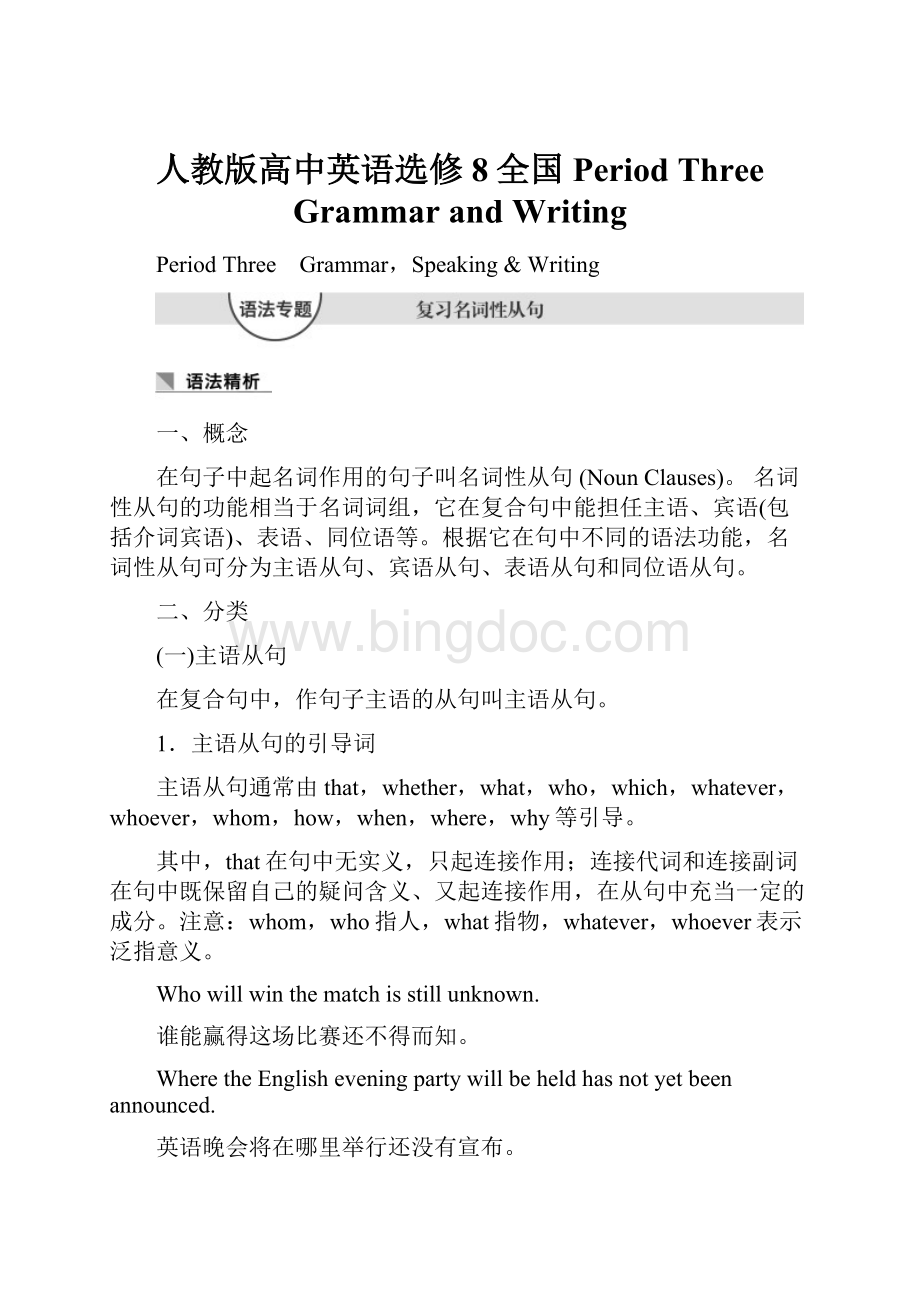人教版高中英语选修8全国Period Three Grammar and Writing.docx
《人教版高中英语选修8全国Period Three Grammar and Writing.docx》由会员分享,可在线阅读,更多相关《人教版高中英语选修8全国Period Three Grammar and Writing.docx(18页珍藏版)》请在冰点文库上搜索。

人教版高中英语选修8全国PeriodThreeGrammarandWriting
PeriodThree Grammar,Speaking&Writing
一、概念
在句子中起名词作用的句子叫名词性从句(NounClauses)。
名词性从句的功能相当于名词词组,它在复合句中能担任主语、宾语(包括介词宾语)、表语、同位语等。
根据它在句中不同的语法功能,名词性从句可分为主语从句、宾语从句、表语从句和同位语从句。
二、分类
(一)主语从句
在复合句中,作句子主语的从句叫主语从句。
1.主语从句的引导词
主语从句通常由that,whether,what,who,which,whatever,whoever,whom,how,when,where,why等引导。
其中,that在句中无实义,只起连接作用;连接代词和连接副词在句中既保留自己的疑问含义、又起连接作用,在从句中充当一定的成分。
注意:
whom,who指人,what指物,whatever,whoever表示泛指意义。
Whowillwinthematchisstillunknown.
谁能赢得这场比赛还不得而知。
WheretheEnglisheveningpartywillbeheldhasnotyetbeenannounced.
英语晚会将在哪里举行还没有宣布。
2.形式主语it
有时为避免句子头重脚轻,常用it代替主语从句作形式主语放于句首,而把主语从句置于句末。
主语从句后的谓语动词一般用单数形式。
常用句型如下:
It+be+名词/形容词/过去分词/不及物动词+that从句
Itisapitythatyoudidn'tattendtheeveningparty.
你没参加晚会真是遗憾。
Itisclearthatlighttravelsinstraightlines.
很明显,光是沿直线传播的。
注意:
连接代词(副词)引导的主语从句,可以使用形式主语it(what引导的主语从句除外)。
但如果句子是疑问句,则必须使用带形式主语it的结构。
Isittruethatheisthegirl'sfather?
他是那女孩的父亲,是真的吗?
3.从句中的谓语动词形式
在主语从句中,用来表示惊奇、不相信、惋惜、理应如此等语气时,谓语动词要用虚拟语气“(should+)do”,常用的句型有:
(1)Itisnecessary(important,natural,strange,etc.)that...
(2)Itissuggested(requested,proposed,desired,etc.)that...
It'snecessarythatwe(should)learnanotherforeignlanguage.
我们很有必要再学一门外语。
It'ssuggestedthatwe(should)takemeasuresatonce.
有人建议我们应该立刻采取措施。
即时跟踪1
1.用所给词的正确形式填空
(1)Whathewantstoreadnoware(be)somemagazines.
(2)It'simportantthatchildren(should)have(have)theirownhobbiesandinterests.
(3)Itisrequested(request)thatheshouldleavebeforeseveno'clock.
2.用适当的连接词填空
(1)It'sapitythathedidn'tcome.
(2)Whethertheywouldsupportuswasaproblem.
(二)宾语从句
在复合句中,用作宾语的从句叫宾语从句。
1.宾语从句的引导词
宾语从句通常由连接词that,whether,if,连接代词或连接副词引导。
(1)由连接词that引导宾语从句时,that在句中不担任任何成分,在口语或非正式的文体中常被省去,但从句是并列句时,第二个分句前的that不可省。
Hehastoldme(that)hewillgotoShanghaitomorrow.
他已经告诉我他明天要去上海。
Wemustneverthink(that)wearegoodineverythingwhileothersaregoodinnothing.
我们决不能认为自己什么都好,别人什么都不好。
注意:
在demand,order,suggest,decide,insist,desire,request,command等表示要求、命令、建议等意义的动词后,宾语从句常用“(should+)动词原形”。
Iinsistthatshe(should)doherworkalone.
我坚持要她自己工作。
Thecommanderorderedthattroops(should)setoffatonce.司令员命令部队马上出发。
(2)连接代词/副词
连接代词有who,whom,which,whose,what,whoever,whatever,whichever等;连接副词有when,where,why,how,whenever,wherever等。
宾语从句相当于特殊疑问句但又不同于特殊疑问句,应注意句子要用陈述语序。
Iwanttoknowwhathehastoldyou.(不能说whathashetoldyou)
我想知道他告诉了你什么。
Shealwaysthinksofhowshecanworkwell.(介词的宾语从句)
她总是在想怎样能把工作做好。
Shewillgivewhoeverneedshelpawarmsupport.(不能用who)
凡需要帮助的人,她都会给予热情的支持。
2.宾语从句的时态
在含有宾语从句的复合句中,当主句动词是过去时态(could,would除外),从句则要用相应的过去时态,如一般过去时、过去进行时、过去将来时等;当从句表示的是客观真理、科学原理、自然现象,则从句仍用现在时态。
但是,当主句动词是一般现在时时,从句根据自身的句子情况,而使用不同时态。
TheteachertoldusthatTomhadleftusforAmerica.
老师告诉我们说汤姆已经出发去美国了。
Iknow(that)hehasstudiedEnglishsince1998.
我知道他自从1998年以来就学习英语。
3.否定转移
在动词think,believe,imagine,suppose等动词后接一个表示否定意义的宾语从句时,其否定通常转移到主句上。
Wedon'tthinkyouarehere.
我们认为你不在这。
Idon'tbelievehewilldoso.
我相信他不会这样做。
注意:
通常只限于主句主语是第一人称的情况。
4.形式宾语it
当宾语从句后跟有宾语补足语时,通常在宾语从句中使用形式宾语it,而将真正的宾语从句移至句末。
Hehasn'tmadeitknownwhenheisgoingtogetmarried.
他还没有宣布他何时结婚。
即时跟踪2
1.单句语法填空
(1)Idon'timaginethathewillcome(come)tomorrow.
(2)Howmuchoneenjoyshimselftravellingdependslargelyonwho/whomhegoeswith,whetherhisfriendsorrelatives.
2.单句改错
(1)Pleasetellmewhichdoyoulikebetter.
(2)Ithink
bestthatyoushouldstayhere.
(三)表语从句
在复合句中,位于系动词之后作表语的从句叫表语从句。
引导表语从句的连接词有that,whether,连接代词和连接副词以及asif/though,because等。
其基本结构为:
主语+系动词+that从句。
Thefactisthatwehavelostthegame.
事实是我们已经输了这场比赛。
Thisiswhereourproblemlies.
这就是我们的问题所在。
Itlooksasifitisgoingtorain.
看上去天要下雨了。
注意:
(1)当主语是reason时,表语从句要用that引导而不是because。
Thereasonwhyhewaslatewasthathemissedthetrainbyoneminutethismorning.
他迟到的原因是早晨他晚了一分钟,错过了火车。
(2)whether可引导表语从句,但与之同义的if却不能引导表语从句。
即时跟踪3
用适当的连接词填空
(1)—Whatamess!
Youarealwayssolazy!
—I'mnottoblame,Mum.Iamwhatyouhavemademe.
(2)Grandmapointedtothehospitalandsaid,“That'swhereIwasborn.”
(3)Thebestmomentforthefootballstarwaswhenhescoredthewinninggoal.
(4)Thereasonwhyhefailedwasthathewaslazy.
三、名词性从句中应注意的几个难点
1.what与that的区别
what
充当主语、宾语或表语等句子成分
that
不充当任何句子成分
Whatweneedtodoisprovidebettereducationforgirls.
我们需要做的就是为女孩子提供较好的教育。
Thatthestudentsneedmoreknowledgeisthekeyproblem.
学生需要知识是最关键的问题。
2.whether与if作“是否”讲时的区别
在下列情况下一般只能用whether,不用if:
a.引导主语从句并在句首时;
b.引导表语从句时;
c.引导从句作介词宾语时;
d.直接与ornot连用时;
e.后接动词不定式时。
Whetherthereislifeonthemoonisaninterestingquestion.(主语)
月球上有没有生命是个有趣的问题。
Everythingdependsonwhetherwehaveenoughmoney.(介词宾语)
一切要看我们是否有足够的钱。
Iwonderwhetherhewillcomeornot.(宾语,可用if)
我想知道他来还是不来。
Canyoutellmewhethertogoortostay?
(不可用if)
你能否告诉我是去还是留?
3.名词性从句的语序
名词性从句必须用陈述语序,而不能使用疑问句语序,尤其是当名词性从句由“疑问词”引导时,不能受疑问句的影响而误用疑问语序。
Inone'sownhomeonecandowhatonelikes.
在自己家里可以随心所欲。
4.who/whoever,what/whatever等的用法区别
一般说来,what/who等含特指意义,而whatever/whoever等含泛指意义,意为“无论什么/无论谁”。
Theclubwillgivewhoeverwinsaprize.
俱乐部将给得胜者奖励。
5.连接词that的省略问题
引导主语从句、表语从句的连接词that不能省略;但引导宾语从句的连接词that通常可省略。
但要注意:
(1)当动词后带有两个并列的宾语从句时,引导第二个从句的连接词that不可省略。
Theteachertoldthestudents(that)theyshouldhandintheirhomeworkthenextdayandthatthehomeworkmustbesignednamesbytheirparents.
老师告诉学生他们要在第二天交上作业,并且作业必须由家长签字。
(2)当that前面有插入语时,that不宜省略。
LittleAlicedidn'tknow,I'msure,thathersisterwasgoingtoAmerica.
我确信,小艾丽斯不知道她的姐姐很快就要去美国了。
(3)有时为了强调,that引导的宾语从句位于句首,此时that不可省略。
ThatsheisagoodgirlIknow.
她是个好姑娘,我是知道的。
即时跟踪4
1.句型转换
(1)Whathashetoldher?
Doyouknow?
(合并为复合句)
→Doyouknowwhathehastoldher?
(2)Asiswellknown,Chinahasthelargestpopulationintheworld.
→ItiswellknownthatChinahasthelargestpopulationintheworld.
2.单句改错
(1)Heislateforclass.That's
hemissedtheearlybus.
(2)
hewantstotellusisnotclear.
(3)Iwonder
ornothewillcometoourparty.
Ⅰ.用适当的连接词填空
1.Itisoftenthecasethatanythingispossibleforthosewhohangontohope.(2016·江苏)
2.Yoursupportisimportanttoourwork.Whateveryoucandohelps.(2016·北京)
3.Themostpleasantthingoftherainyseasonisthatonecanbeentirelyfreefromdust.
(2016·北京)
4.Ashipinharborissafe,butthat'snotwhatshipsarebuiltfor.(2015·安徽)
5.WemustfindoutwhenKarliscoming,sowecanbookaroomforhim.(2015·重庆)
6.Howweunderstandthingshasalottodowithwhatwefeel.(2015·北京)
7.Itrulybelievethatbeautycomesfromwithin.(2015·北京)
8.Ifyouswiminariverorlake,besuretoinvestigatewhatisbelowthewatersurface.Oftentherearerocksorbrancheshiddeninthewater.(2015·浙江)
9.Theexhibitiontellsuswhy/thatweshoulddosomethingtostopairpollution.(2015·四川)
10.WhereLiBai,agreatChinesepoet,wasbornisknowntothepublic,butsomewon'tacceptit.(2015·江苏)
11.Asnaturalarchitects,thePuebloIndiansfiguredoutexactlyhowthicktheadobewallsneededtobetomakethecycleworkonmostdays.(2015·全国Ⅱ)
Ⅱ.单句改错(每小题仅有1处错误)
1.Myuncleistheownerofarestaurantcloseto
Ilive.(2016·全国Ⅰ)
2.Someclassmatessuggestwe
gotoplacesofinterestnearby.
3.Afterlookingatthetoyforsometime,heturnedaroundandfound
或wherehisparentsweremissing.(2015·全国Ⅱ,短文改错)
4.“Hehasruinedhishealth.Weareworriedabouthim.”Thatis
otherteacherssay.
(2013·辽宁,短文改错)
5.Thisis
Ineedtoimproveinthefuture.(2013·大纲全国,短文改错)
6.Butbeforelongtheybegantosee
washappening.(2012·新课标全国,短文改错)
7.Itwasapity
someofuswerenotpresentastheyhadgoneabroadforfurtherstudies,buttheycalledbackorsentgreetingcardsfromdifferentplaces.(2008·辽宁,短文改错)
Encouragingotherstospeak
Welldone!
干得好!
Youcandoit.你能行。
You'llmakeit.你会成功的。
Justhaveatry.试一下。
Dobeconfident.务必自信。
Keeptrying.加油/继续努力。
Cheerup!
高兴起来,振作起来!
Comeon!
加油!
Questionsandexpressions
Whereareyou?
你在哪里?
Whatareyoudoingthere?
你在那里正做什么?
Really?
真的吗?
Andwhatabout...?
……怎么样?
What'sitreallylike?
它到底像什么?
Whatdoyouthink?
你怎么想的?
Whathappenedthen?
接着发生什么事了?
Indeed?
真的吗?
Isthatso?
真的是那样吗?
Good.好。
Yes,that'sright.是的,就是那样。
Thatsoundsinteresting.听起来很有趣。
Oh,Isee.哦,我明白了。
Soundsgreat!
听起来挺棒!
JustasIthought.和我想的一样。
【即时跟踪】
语法填空
Jonny:
Hey!
I'mjustpracticingtaichi(太极).Wouldyouliketojoinme?
Peter:
Iknownothingaboutit.Isitdifficult?
Jonny:
Itseemseasy,butyouneedalotofpractice.Youjustfollowmelikethis.
Peter:
OK.Don'tlaugh1.atme.Imaylookfunny.
Jonny:
Bendyourkneesslightlyandreachoutyourarmsliketreebranches,naturallyand2.softly(soft).Trytokeepyourbodystraight.Moveslowly,thenbesuretokeepyourbalanceanddon'tletyourbodyshake.
Peter:
Icannotcontrolmybodywell.Mylegsbecome3.painful(pain).
Jonny:
Keep4.holding(hold)yourpositionforawhile.Ithelpsdevelopyourstrengthandflexibility.Raiseyourlegandlet5.itstayintheairforseconds.
Peter:
Ifeelmylegsshaking.Icannotdothisanylonger.
Jonny:
Bepatient!
Taichi6.iscalled(call)“shadowboxing”inEnglish.Itasksyoutoactlikewater:
tobeflexibleaswell7.asstrong.Inrealcompetition,ataichimasterborrowsthestrengthofthecompetitorandusesthisenergytofightback.The8.harder(hard)youtrytobeathim,themorelikelyyouwillgethit.Hecontrolsyou!
Peter:
Unbelievable!
Oh...,9.ifyoudon'tmind,I'llstopandtakeadeep10.breath.
【文体指导】
1.描写某地的景色或景观时,一般要遵循的原则是:
从总体到局部,从外到内。
2.这类文章一般包括三段:
开头是总体介绍,引出主题;中间是正文,具体介绍此地的特色,如著名的建筑、风景名胜等;第三部分是结尾。
3.描写某地的短文属说明文体,要弄清时间的立足点是“过去”、“现在”还是“将来”。
4.表达方式要有所变化,景物描写用词容易重复、单调,因此写作时应选用不同的句式和表达方式来描述事物,使表达方式多样化。
常用句式
1.位置(location):
(1)liesin/to/on...
(2)Therestands...
(3)islocated/situatedin...
(4)stretchesalong...
2.面积(area):
(1)coversan